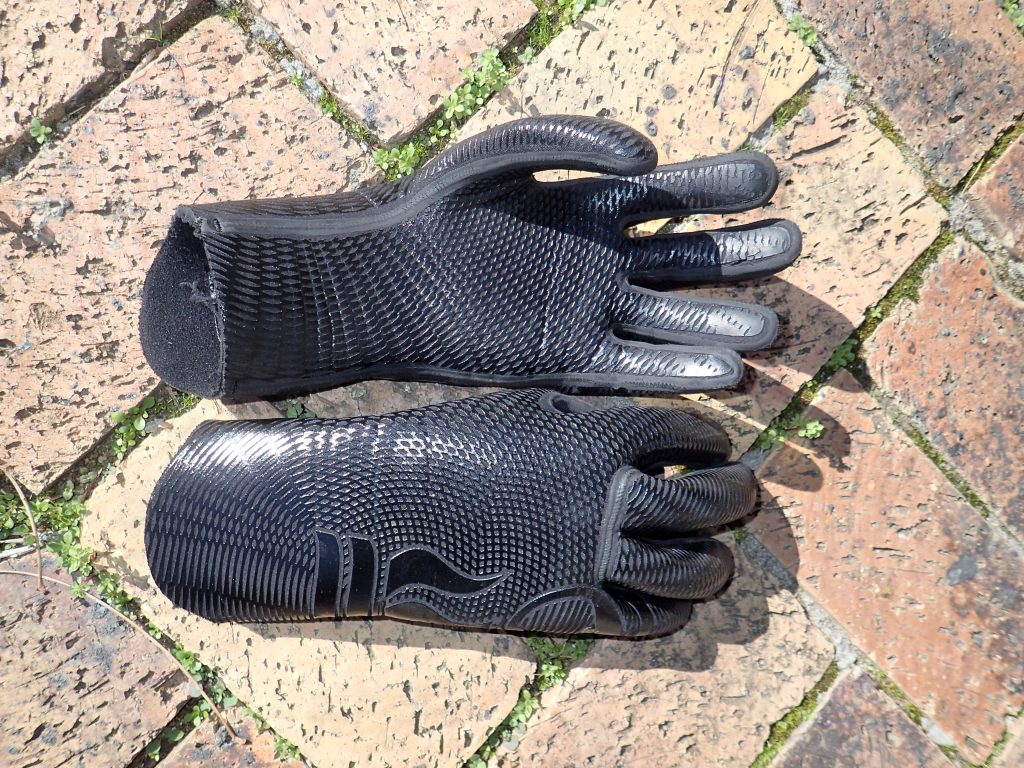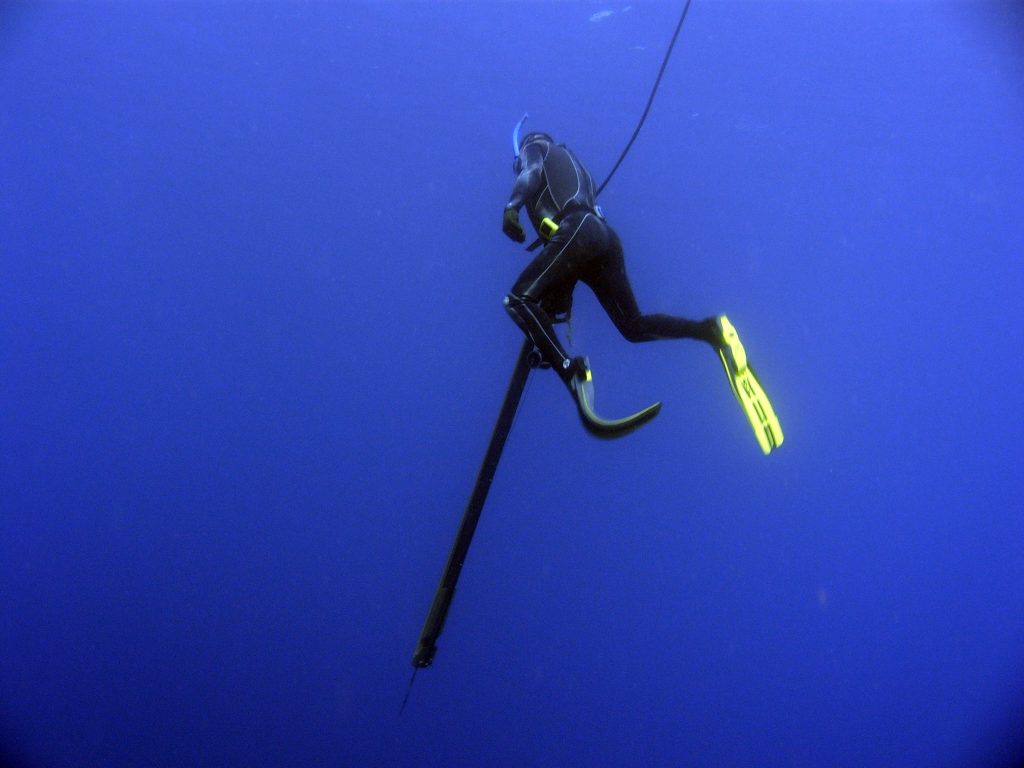Spearfishing is an exciting and affordable sport and an excellent way to fish. There’s a bit of a learning curve but you can accelerate it using the right spearfishing equipment and techniques.
In this article, we’ll discuss 13 great spearfishing tips that you can use to improve your skills. They’ll help you make the most out of this outdoor activity and land more fish.
1. Know Your Limits
It’s critically important to know your endurance and fitness levels. You don’t want to dive into places that are too advanced for your experience and skill levels.
Plus, you should also know how long you can easily hold your breath for, tread water and at what depths you are comfortable. It’s also important to select your target wisely.
For example, if you can’t hold your breath for long and lack endurance, then fighting a large fish at 30 feet below the surface won’t be a great idea.
2. Always Wear Gloves

Wearing a high-quality pair of spearfishing gloves is a must before diving. It’ll protect your hands from sharp barnacles, fins, and rakers. Not only will it protect your hands, but it’ll also allow you to hold and control your pole spear/spear gun efficiently.
3. Use the Right Fins
You’ll need to use the right fins depending on the nature of the hunting field. If you’re planning to dive deep for spearfishing, long freediving fins will suit you the best. Not only will they allow you to use less energy to cover more distance but they’ll also help you move faster.
Freediving fins are usually more expensive than the standard ones but they’re worth the price. However, if you’re planning to dive into shallow water with reefs, you can use standard fins. That’s because the long freediving ones can damage the fragile corals and will be easier to get in an around rocks.
4. Respect Your Weapon
A spear gun or a pole spear is a weapon and it must be respected as such. You must never point your weapon at your dive buddies or any other human.
It’s also important to note that a spear gun has a very powerful recoil and should never be loaded or fired on dry land.
Like all guns, you should only place your finger on the trigger when you are lined up on your target and ready to fire.
You can hurt your body or face badly if you fire it accidentally. We recommend you get familiarized with your weapon by performing underwater tests before you go into the field for hunting.
You should always consider your spearfishing weapon an extension of your arm. It must always be fired by keeping your elbow straight. The risk of missing the target will increase if you bend your wrist or elbow as your shot will be off.
5. Service Your Spearfishing Equipment
Before you go spearfishing, you need to make sure that your weapons are in good condition. The pointy end of your spear can get damaged due to collisions with reef and rock and a blunt spear won’t help you catch fish.
So, make a habit of inspecting all your spearfishing equipment before you leave home, and service it if needed. If you’re interested in a pneumatic gun, make sure that you can get it serviced locally.
6. Use Appropriate Weapons
If you’re such a spearfishing enthusiast who wants to carry only the essential tools, make sure that you use appropriate weapons based on the fish species you’re targeting. If you want to catch big fish, you’ll need a more powerful spear gun and a big float and float line.
For example, you don’t want to go after a 100+ pound Giant Trevally if you have a 20-inch(55cm) cave spear gun and no float-line. Not only could it make you lose or damage your equipment but it can also put you in a dangerous situation where you can get badly injured or even drown.
7. Always Carry a Knife
A sharp spearfishing knife is one of the most important spearfishing tools that you must always carry. If you can carry two and make sure that you can easily reach either of them with both hands.
The main purpose of a spearo's knife is to quickly and humanely dispatch fish that was shot. Since the waters we dive in is often shark invested the last thing we want is a struggling bleeding fish on our float lines.
Secondary purpose is to cut line or ropes. Hopefully you are never in an entanglement situation where your life will depend on how quickly you can cut a rope. It has happened to divers before and if this happens to you you will be glad that you got the best knife that you could afford.
In a worst case scenario a dive knife could also be used in a self defense situation against aggressive sea life. A speargun puts more distance between you and your assailant but it could very easily happen that you speargun is not close at hand.
Other than inspecting the handle and blade of a knife, you should also check its scabbard while buying. Make sure that it feels comfortable and secure on your leg and is easily removable from the mechanism holding it in place.
8. Respect Local Laws
While most fish can be hunted, there are some rare species that are protected, and hunting them is not allowed. Authorities can take disciplinary actions if you hunt such threatened fish species and it can be extremely costly.
Therefore, you should always understand and follow local laws because ignorance will not justify anything. Not only will it keep you from facing any trouble from authorities but it will also protect the ecosystem.
9. Improve Your Diving Skills

As a beginner, your main focus should be on improving your diving skills. A safe and good dive will allow you to spend more time underwater and increase the probability of catching good fish. It will also help you improve your steady breathing, buoyancy, and other fundamental skills.
Before buying that second speargun consider spending the money on a freediving or spearfishing course.
10. Improve Your Aim
One of the best ways to improve your aim is to practice in your backyard pool. Wear your full spearfishing kit, including the weight belt, and try to hit some floating objects such as plastic bottles. Make sure that you don’t impact the pool’s walls with your pole spear or speargun.
It’s important to let go of your polespear fully while practicing. Feathering the pole will slow it down and result in affected accuracy and reduced penetration power. Practicing in a pool will also help you improve your breath holding skills, which is critically important for spearfishing.
11. Start with Small Fish
Pick small fish during your first spearfishing sessions to improve your accuracy. Dive near reefs and jetties where the water is shallow and you have more places to hide behind.
In addition, make sure that you don’t hit anything that you don’t want to or can’t eat. After selecting your target, make sure that you hit it near or behind the top of their gill. It will increase the chances of killing the fish in one shot and reduce the risk of errors.
There's no shame in shooting small fish. In fact it takes a much better marksman to shoot small fish.
12. Set Multiple Exit Points
Keep in mind that the conditions on the water can change pretty quickly. Conditions may have been ideal for diving into the water safely from one of the ocean rocks.
But it’s not necessary that those conditions will remain the same to safely come out of the water after a few minutes. That’s why it’s advisable to set multiple exit points. It will allow you to come out of the water safely.
13. Never Give Up
It’s common among beginners to miss their target but you must never give up. Keep in mind that you stop being a hunter as soon as you drop your attention. Never head back to the boat by giving up because you never know when you’ll be surprised by the biggest fish of the day.
Always keep your eyes on the fish but don’t make eye contact. Try to swim with your target to get as close as possible. Additionally, take your time to aim properly before shooting.
Persistence is important in spearfishing and landing dream fish.
Final Words
The best thing about spearfishing is that anyone can learn it but it requires practice, patience, and time. Using the right techniques, you can accelerate your learning curve and improve your spearfishing skills.
We hope the tips and tricks mentioned in this guide will help you become a better spearo and catch more fish.


